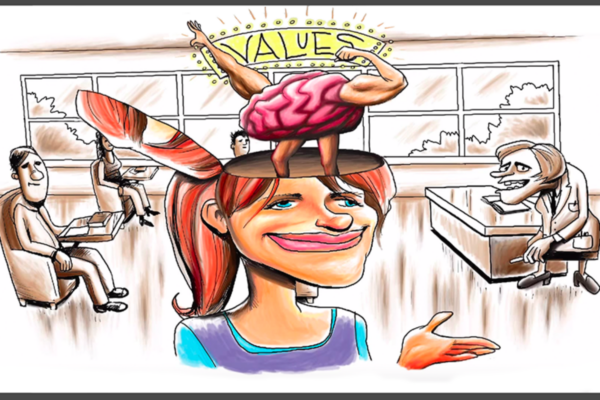Quick — what’s the difference between moral muteness and moral myopia? Are incrementalism and ethical fading the same? And do you know deontology from utilitarianism? Most people know that ethics have to do with right and wrong, but few outside the field of philosophy have the vocabulary and knowledge of these concepts that make deep understanding or discussion of ethics possible.
In 2011, the McCombs School of Business received a gift from an anonymous donor who wanted to improve ethics education. The donor stipulated only that whatever the school created would be universally accessible and free.
The result was Ethics Unwrapped, a video series and educational program launched the following year and free to anyone with an internet connection. Seven years on, the program’s website now gets about 120,000 visitors a month and has been viewed in more than 170 countries. Ethics Unwrapped’s faculty director, Professor Robert Prentice of the McCombs School, an expert in the field of behavioral ethics, has provided much of the content for the project’s 130-plus videos, which are generally 5 minutes or less and illustrate ethics concepts with a narrator and simple, whimsical animation. Additionally, other faculty members from across campus have made contributions and provided feedback.
Created primarily for university students, the videos have been watched at more than 1,500 college campuses around the world. They have been used in business schools but also in areas such as education, social work, law, medicine, liberal arts, computer science, natural sciences, communications and performing arts. The list of academic institutions that regularly use Ethics Unwrapped includes all of the top 20 research institutions in the United States and 85% of the premier research universities around the globe. The Naval War College has integrated Ethics Unwrapped into its leadership training for the U.S. Navy.
But the videos also have been used by high schools, churches and scout troops. They have helped teach ethics at nonprofits, clubs and organizations, startups and Fortune 500 companies. They’ve been used to teach ethics to employees of city, state and federal governments. They’ve been used by professional associations of lawyers, accountants, financial professionals, academics, geologists and others. AT&T embedded Ethics Unwrapped videos on its intranet as part of its ethics and compliance training. And if the name looks familiar, it could be because the UT System’s University Compliance Services shares Ethics Unwrapped videos monthly with all UT Austin employees.
The Science of Right and Wrong
Two important trends came together to lay the foundation for the success of the project that became Ethics Unwrapped. First, it will come as a shock to no one that students love screens and learning through videos. Millennials and members of Gen Z spend more than half of their waking hours looking at screens and so are often most comfortable learning via videos. Hiring Cara Biasucci away from the University of North Carolina, where she was teaching filmmaking, to be project director set Ethics Unwrapped on a promising path. Biasucci had extensive experience as an independent filmmaker, an education in philosophy and a passion for improving the world.
Second, and perhaps most important at a research university, the project keeps its pronouncements on ethics firmly rooted in science as opposed to tradition. For 2,000 years, ethics has been studied primarily through the lens of philosophy. Philosophy is crucial to the study of ethics, but unfortunately there is often a large gap between people’s good intentions and their subsequent actions. The research in behavioral ethics helps to explain why good people sometimes do bad things.
That extends to the program’s reason for being. “Research indicates that one of the primary determinants of happiness for adults is being able to credibly tell themselves that they have lived honorable lives and contributed to their world,” says faculty director Prentice. “The more pro-social activity people have engaged in, the more satisfied with their lives they tend to be.”
Other research shows that the more ethical behavior exists in a society, the more people trust one another. In turn, that trust strongly correlates to economic growth. So, if ethics education can improve ethical behavior, it will contribute to both individual happiness and to economic prosperity.
Greater understanding
Doing the right thing “because I said so” can be a hard sell, so the program focuses on the field of behavioral ethics in the hope that better understanding of why we behave in a certain way will cause us to make better decisions in the future. Researchers from behavioral psychology, cognitive science and evolutionary biology have begun to systematically study how and why people make the ethical and unethical decisions they do.
Most of the videos use a combination of animation and student interviews to succinctly define ethics terms, present real-world examples, explain basic concepts and offer ideas for application. They tell stories that appeal to the students’ emotional and moral sense as well as to the cognitive portions of their brains. They appeal to students’ hearts as well as their heads, which is useful because, as the videos teach, the vast majority of moral decision-making is intuitive and emotional rather than cognitive.
Ethics Unwrapped videos are supplemented by case studies, teaching notes, discussion questions and bibliographies, and all the program’s content, as well as its website, is translated into Spanish. Today, an advisory council of experts — including Meme Drumwright in UT’s Moody College of Communication and experts from Harvard University, Stanford University and the UT System — helps guide the program.
• The 36 videos in the “Concepts Unwrapped” series address a broad variety of ethics topics but focus primarily on behavioral ethics.
• The “Ethics Defined” series constitutes a visual glossary of 51 key ethics concepts.
• The “Giving Voice to Values” series contains eight videos that bring to life Mary Gentile’s program that teaches people how to advocate effectively for their position once they have decided what the right thing to do is.
• At the heart of the “In It To Win” series is a 24-minute documentary featuring disgraced lobbyist Jack Abramoff.
• And the 29 “Scandals Illustrated” videos sum up ethical lapses including those involving Wells Fargo, Theranos, Equifax, Volkswagen, Lance Armstrong, Michael Flynn and others.
The project has been rewarded by additional grants ($150,000 from the Teagle Foundation and $50,000 from the UT Provost’s Office) and support from the McCombs School’s Center for Leadership & Ethics that have allowed it to continue its work. It also has won 15 awards for academic and filmmaking excellence since its launch. In 2014, it was named one of the five programs changing education at UT. Most recently, the series received the 2019 Reimagine Education Bronze Award for Business Education.
Studies of the program’s effectiveness validate these awards. In a two-year survey of about 8,600 UT undergraduates in a wide range of departments, more than half reported a lack of confidence in their ability to identify, discuss or apply ethics concepts before watching the videos. After watching them, 88% reported feeling confident or very confident in their ability to do these things. And 90% reported that watching the videos had helped them master complex behavioral ethics concepts.




